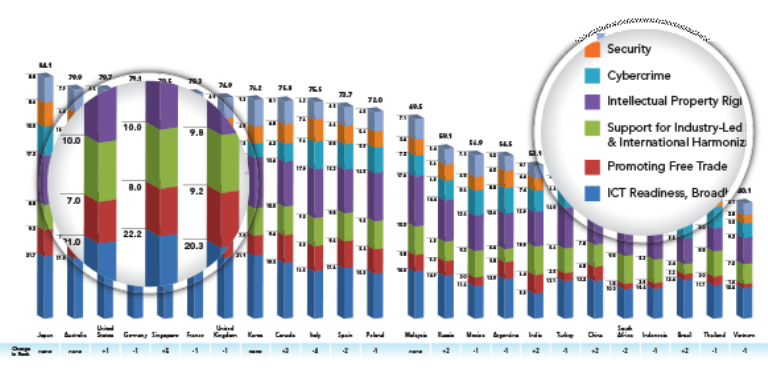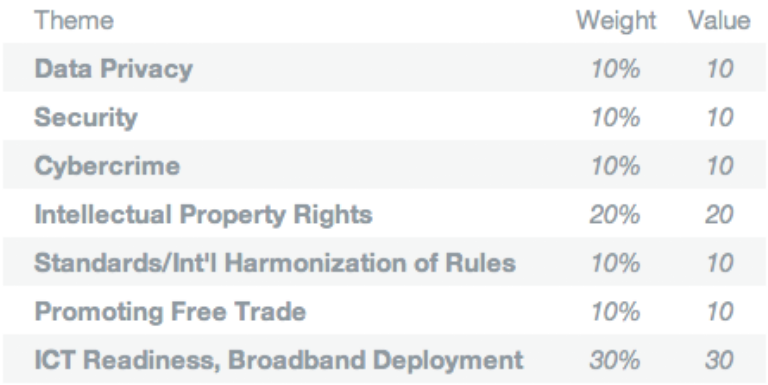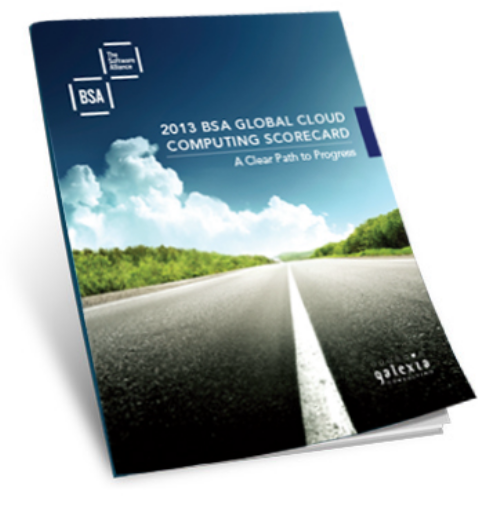 About Us - Galexia News
About Us - Galexia News
2nd Global Cloud Computing Readiness Scorecard launched - 7 March 2013
The 2013 Global Cloud Computing Scorecard — the first-ever report to track year-over-year change in the international policy landscape for cloud computing — shows that cloud readiness is improving, if unevenly.
These findings come against the backdrop of the massive and well-documented movement to cloud services by consumers, businesses, and governments. What hasn’t been documented until now is the less steady improvement in the policy environment to support global cloud computing, with some countries making big strides to improve their cloud readiness while others, including some of the world’s largest technology markets, have stalled or even backtracked.

|
(BSA Global Media Release - 7 March 2013 - Washington) Progress on Cloud Computing Policy Is Hit and Miss Around the World - Singapore leaps forward in global policy rankings; Japan, Australia, and US lead global market; Europe stalls Countries around the world are improving the legal environment for cloud computing — though at an uneven pace that risks undermining the full economic potential of cloud technologies. The 2013 BSA Global Cloud Computing Scorecard — the first report ever to track changes in the global policy landscape for cloud computing — finds that while many of the world’s biggest IT markets have stalled or slid backwards, others are embracing laws and regulations conducive to cloud innovation. The Scorecard also finds that policy fragmentation persists, as some countries, aiming to promote local cloud markets, adopt laws and regulations that inhibit cross-border data flows or skew international competition. The new 2013 BSA Cloud Scorecard builds on an inaugural edition of the report released last year. The biggest mover in the rankings is Singapore, which vaulted to fifth from 10th place a year ago by adopting a new privacy law that builds user trust while also promoting business innovation. The 2013 study finds that Japan continues to lead the global rankings with a comprehensive suite of laws supporting digital commerce. Australia remains in second place, and the US has edged into third, pushing Germany down to fourth. The study finds that policy improvements in many of the world’s biggest IT markets have stalled. Notably, all six European Union countries covered in the study have lost ground in the rankings. Others are effectively unplugging themselves from the global market — with especially counterproductive policies in Korea, Indonesia and Vietnam. The study evaluates countries in seven policy areas critical to the market for cloud computing services — data privacy, cybersecurity, cybercrime, intellectual property, technology interoperability and legal harmonization, free trade, and ICT infrastructure. Among the study’s findings:
|
The BSA Global Cloud Scorecard analyzes the legal and regulatory framework and broadband infrastructure of 24 countries that together make up 80 percent of the global ICT market. The analysis is grouped under seven policy categories that are central to the growth and operation of cloud computing.
The study includes a detailed country-by-country analysis of legislation, regulations, case law, government policy and standards. The assessments include an evaluation of enforcement and implementation of existing laws in each country, as well as an assessment of compliance with relevant treaties and global agreements where applicable. The Scorecard analysis is based upon a combination of published information and statistics and evaluation by independent experts at Galexia.
Each country's score is computed using a 66-item scoring grid and analyses. The scores are derived using a weighted system that allocates different weights to each section/question. A number of basic fact-finding questions are excluded from the scoring system. Each group of questions is weighted to reflect its importance to cloud computing and each individual question is also weighted to reflect its importance within the group. To help with the scoring and usability of the study, the assessments are based on a series of questions that are framed so that a "yes" response reflects a favorable policy setting for global cloud computing. The weights are shown in the table below and the results are available in the downloadable report.

The 2013 Scorecard follows on from the groundbreaking 2012 Scorecard and contains:
- Updates across 24 countries and 66 criteria, including:
- 27 significant (positive) changes
- 34 moderate (positive) changes
- 6 moderate (negative) changes
- 108 minor (no effect) changes
- 432 infrastructure changes
- Tracks changes in score and rank from 2012
- 3 new case studies
Galexia Microsite:
- Global Cloud Computing Score Card (2013) summary micro-site - Browse themes and country summary reports
Download the scorecard and 24 country reports:
![[ Galexia Dots ]](/images/hr.gif)

![[2018 Global Cloud Computing Readiness Scorecard]](/public/ssi/pubs/pub_1.png)



 print this page
print this page sitemap
sitemap manage email subscriptions
manage email subscriptions